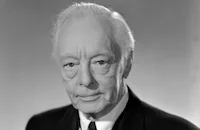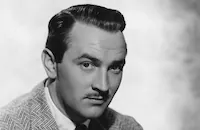The First Hundred Years
Brief Synopsis
Cast & Crew
Richard Thorpe
Robert Montgomery
Virginia Bruce
Warren William
Binnie Barnes
Alan Dinehart
Film Details
Technical Specs

Synopsis
David Conway and his wife Lynn, happily married for five years, owe their affluent New York lifestyle more to Lynn's salary as a successful literary and theatrical agent than David's as a ship designer. When David learns that he soon will be in charge of a shipyard in New Bedford, he assumes that Lynn will quit her job and be content to live on his salary, but she feels that her work is just as important as his. They argue, then make-up, but each incorrectly assumes that the other has changed position. When Lynn suggests that they each keep their jobs and get together on weekends, David realizes that she will not give up her work and leaves. Though she is very upset, her boss, Harry Borden, tells her to "out bluff" David by going on an assignment for a few days in Hollywood. Meanwhile, Harry's lawyer, Samuel Z. Walker, and David's lawyer, William Regan, discuss terms of the separation. When Lynn returns from Hollywood she discovers that a hearing has been set and learns from Judge Parker that she must pay David alimony of four hundred dollars a month during their separation, as she earns more than he. David doesn't want the money, but decides to "raise the ante" on their game of wills and accept. Some time later they meet in a nightclub where he has taken Claudia Weston, a client of Harry's. Lynn decides to go with them to the apartment of client George Wallace, who is also an old friend of David's, and watch George, perform on war drums left to him by his Indian grandfather. When David and Claudia leave, Lynn realizes that their marriage is over. A few days later, Lynn's Uncle Dawson sends a telegram that he wants to spend a night with them on the way to Europe, and she asks David to pretend that they are together so that Dawson will not be upset. This gives Walker a perfect opportunity to have someone spy on David and show that he returned home and therefore should not get alimony. During the night a storm frightens David and he goes to Lynn's room to comfort her. They are on the verge of being reconciled when Uncle Dawson catches Wilkins, Walker's "spy," in the hall. David then leaves, thinking that the whole thing was a trick perpetrated by Lynn. The next day, Lynn learns through the results of a routine examination for life insurance that she is pregnant. She goes to David, who is clearing his things from their apartment, and asks to be reconciled, but he refuses, saying that nothing is left between them. She leaves without telling him about the baby, but a few moments later Harry and Walker, both drunk from celebrating, joyfully congratulate David on the baby. David then runs after Lynn and they drive off for New Bedford together. David then says that maybe they should have a baby and Lynn says she'll think about it.

Director

Richard Thorpe
Cast

Robert Montgomery

Virginia Bruce

Warren William

Binnie Barnes

Alan Dinehart

Harry Davenport
Nydia Westman
Donald Briggs

Jonathan Hale

E. E. Clive

Lee Bowman
Torben Meyer
Bodil Rosing

Irving Bacon
Priscilla Lawson
Rex Evans
Edgar Dearing
Eleanor Lynn
Jean Fenwick
Monte Vandergrift
Wally Maher
Harry Strang
Roger Converse
Barbara Bedford
Frederick Clarke

Roger Moore
Lane Chandler
Crew
Dr. William Axt
Melville Baker
Joe Edmundsen
Chet Forrest
Cedric Gibbons
Norman Krasna
Norman Krasna
Urie Mccleary
Stanley Murphy
Conrad A. Nervig
Tony Ordoqui
Joseph Ruttenberg
Douglas Shearer
Dolly Tree
Percy Wenrich
Edwin B. Willis
Bob Wright
Dolph Zimmer

Film Details
Technical Specs

Articles
The First Hundred Years
The First Hundred Years was created from a story by screenwriter Norman Krasna, though the screenplay is by another writer, Melville Baker. Montgomery and Bruce play a once-happy couple whose five-year-old marriage suffers from conflicting careers; he's an unemployed shipbuilder who finally lands a job in New Bedford, Mass. The rub is, she's prospering as the manager of a theatrical agency in New York City, where she's been the breadwinner for some time.
The chauvinistic husband insists that, although the wife's job is more lucrative, she should give up her career and become a New Bedford housewife. She understandably rebels at first, but the movie seems dated in its attitudes as it seems to come down solidly on the husband's side. After the marriage is strained to the point of a legal separation, a certain development causes the wife to rethink matters and give in to her husband's demands -- so that she is the one who makes the sacrifices.
William has the somewhat thankless role of the dashing owner of Bruce's company, who carries a torch for her but doesn't light her fire. The irony is that, in pre-Code days, he might instead have played the husband -- as a selfish cad ready to be taught a thing or two by a high-spirited woman in the mold of a Barbara Stanwyck or Jean Harlow. As it is, William has a few funny lines and an amusing drunk scene with Alan Dinehart as a hapless lawyer friend. But he remains on the sidelines.
The likeable supporting cast also features Binnie Barnes as a woman who makes a minor play for Montgomery, Harry Davenport as a balmy old uncle and Lee Bowman as an aspiring writer proud of his native American heritage.
The director is Richard Thorpe, who a year earlier had guided Montgomery through one of the triumphs of his acting career in his Oscar®-nominated role as the psychopathic killer of Night Must Fall (1937). Montgomery and leading lady Bruce co-starred in a second 1938 film, Yellow Jack.
Producer: Norman Krasna
Director: Richard Thorpe
Screenplay: Melville Baker (screenplay); Norman Krasna (story)
Cinematography: Joseph Ruttenberg
Art Direction: Cedric Gibbons
Music: Dr. William Axt
Film Editing: Conrad A. Nervig
Cast: Robert Montgomery (David Conway), Virginia Bruce (Lynn Claymore Conway), Warren William (Harry Borden), Binnie Barnes (Claudia Weston), Alan Dinehart (Samuel Z. 'Sam' Walker), Harry Davenport (Uncle Dawson), Nydia Westman (Miss Midge Finch), Donald Briggs (William 'Bill' Regan), Jonathan Hale (Judge Parker), E.E. Clive (Chester Blascomb).
BW-74m. Closed Captioning.
by Roger Fristoe

The First Hundred Years
Quotes
Trivia
Notes
Working titles of this film included Turnabout and Wooden Wedding. According to a news item in Hollywood Reporter, Robert Montgomery appeared on M-G-M's Good News radio program on March 10, 1938, recreating scenes from the film.















